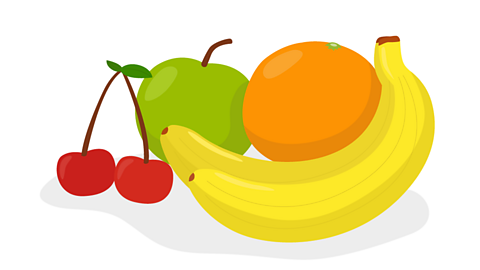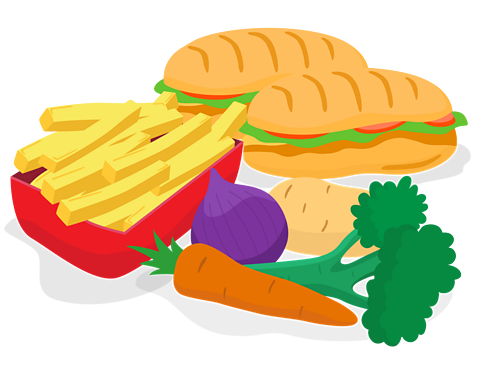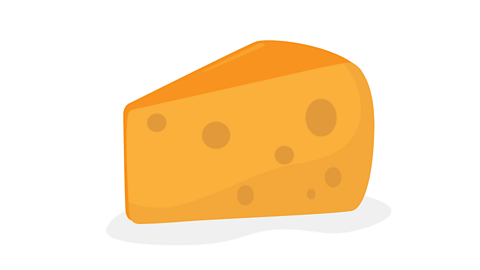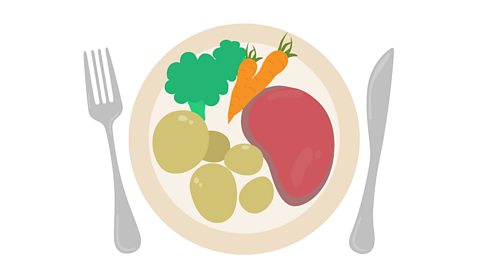If you travel in France or a French-speaking country, it's important to be able to talk about what you like to eat and drink.
Here are some useful phrases to help you.

Talking about food and drink in French
When talking about food and drink, it's useful to be able to talk about what you like and don't like.
The French for 'to like' is Check your connection, refresh the page and try again.. This form of the verb is called the infinitive.
You can recognise an infinitive in English as it begins with to, such as 'to like' or 'to eat'.
In French, you can spot an infinitive by looking at the end of the verb. All French infinitives end in either -er, -ir or -re.
As aimer ends in -er it is called an -er verb.


Saying what you like and don't like
To say 'I like', you say:
- Check your connection, refresh the page and try again. – I like
Can you see that the end of the verb is no longer -er but -e? The ending of the verb changes depending on who is doing the action.
Remember that before the verb, you use the word for I - je. As the verb aimer begins with a vowel, je changes to j' to make it easier to say.
- Je + aime = J'aime
To say 'I don't like', you need to add ne or n' (before a vowel) before the verb and pas after the verb.
- Check your connection, refresh the page and try again. – I don't like

Food in French
Here are some words for food so you can say what you like or don't like.
Did you notice that all the words begin with either le, la, l' or les? This means 'the' and it is called the definite article.
You can learn more about this in Indefinite and definite articles.
| French | English |
|---|---|
| Check your connection, refresh the page and try again. | chips |
| Check your connection, refresh the page and try again. | cheese |
| Check your connection, refresh the page and try again. | fruit |
| Check your connection, refresh the page and try again. | ice cream |
| Check your connection, refresh the page and try again. | hamburger |
| Check your connection, refresh the page and try again. | ham |
| Check your connection, refresh the page and try again. | vegetables |
| Check your connection, refresh the page and try again. | egg |
| Check your connection, refresh the page and try again. | bread |
| Check your connection, refresh the page and try again. | fish |
| Check your connection, refresh the page and try again. | chicken |
| Check your connection, refresh the page and try again. | sandwich |
| Check your connection, refresh the page and try again. | meat |

Now you can say what you like:
Check your connection, refresh the page and try again. – I like cheese
Check your connection, refresh the page and try again. – I like chips
Check your connection, refresh the page and try again. – I like vegetables
…and what you don't:
Check your connection, refresh the page and try again. – I don't like cheese
Check your connection, refresh the page and try again. – I don't like chips
Check your connection, refresh the page and try again. – I don't like vegetables

Did you know?
Did you notice that in French you say 'the' before the noun, whereas in English you don't?
You can also say that you like more than one thing if you use the word for 'and' – Check your connection, refresh the page and try again..
Check your connection, refresh the page and try again. – I like cheese and bread
Check your connection, refresh the page and try again. – I like fish and chips
Drinks in French
Here are some words for drinks.
| French | English |
|---|---|
| Check your connection, refresh the page and try again. | coffee |
| Check your connection, refresh the page and try again. | water |
| Check your connection, refresh the page and try again. | orange juice |
| Check your connection, refresh the page and try again. | apple juice |
| Check your connection, refresh the page and try again. | milk |
| Check your connection, refresh the page and try again. | tea |

Saying what you prefer
You might want to say that you like something, but you prefer something else.
- Check your connection, refresh the page and try again. is the French word for 'to prefer'.
To say 'I prefer' you say:
- Check your connection, refresh the page and try again. – I prefer
You can also add the useful conjunction Check your connection, refresh the page and try again. (but). Conjunctions are joining words that link together parts of a sentence.
Check your connection, refresh the page and try again. – I like vegetables, but I prefer meat.

Mealtimes
Here are words for mealtimes in French.
| French | English |
|---|---|
| Check your connection, refresh the page and try again. | breakfast |
| Check your connection, refresh the page and try again. | lunch |
| Check your connection, refresh the page and try again. | afternoon snack |
| Check your connection, refresh the page and try again. | dinner |
| Check your connection, refresh the page and try again. | meal |
How do I say 'I eat' in French?
The French word for 'to eat' is Check your connection, refresh the page and try again..
Manger is a regular verb like aimer - to like.
The endings of verbs change, depending on the person or thing doing the action, for example, je - I, tu - you, elle - she or it, il - he or it.
Regular verbs change in the same way, so once you know how a regular verb changes, you will be able to use lots of different verbs in the same way.
Below are the endings for regular -er verbs. You remove the -er from the infinitive manger, then you add these endings.
| Pronoun | Stem | Ending | Example | English |
|---|---|---|---|---|
| je | mang | e | Check your connection, refresh the page and try again. | I eat |
| tu | mang | es | Check your connection, refresh the page and try again. | you eat |
| elle | mang | e | Check your connection, refresh the page and try again. | she eats |
| il | mang | e | Check your connection, refresh the page and try again. | he eats |
Did you notice that the verbs sound the same, even though the endings are different?
How do I say 'I drink' in French?
The French word for 'to drink' is Check your connection, refresh the page and try again.. This is an irregular verb, so it doesn't change in the same way as regular verbs. This means you need to remember the different forms.
You remove the -re from the infinitive boire, then you add these endings.
| Pronoun | Stem | Ending | Example | English |
|---|---|---|---|---|
| je | boi | s | Check your connection, refresh the page and try again. | I drink |
| tu | boi | s | Check your connection, refresh the page and try again. | you drink |
| elle | boi | t | Check your connection, refresh the page and try again. | she drinks |
| il | boi | t | Check your connection, refresh the page and try again. | he drinks |
Did you notice that they all sound the same? This is because s and t are silent letters.
You can also use the infinitive of manger or boire to say what you like to eat and drink.
Check your connection, refresh the page and try again. – I like to eat ice cream
Check your connection, refresh the page and try again. – I like to drink orange juice
Key French sounds
Below are some important French sounds that you have heard in this topic. Try practising them yourself out loud.
- e
There are different ways of saying and writing e in French. One way of saying the e sound can be written as Ă©, -er, es, ez and et.
All these letter combinations make the same sound, which is not found in English. It is a short, sharp sound which you might use to attract someone's attention.
Check your connection, refresh the page and try again. - chips
Also the same sound as -er, -es, -ez and et
- e
Another way of saying e in French sounds like the e in the English word egg.
This can be written as e before two consonants, è, ê, ai, aî, ei and e before a final c, l or t.
Check your connection, refresh the page and try again. - but
Remember that the s at the end of a word is silent.
Also written as è, ê, ai, aî, ei and e before a final c, f, l and t
- th
These letters make the same sound as t in English.
Check your connection, refresh the page and try again. – the tea
Bitesize Primary games. game
Play fun and educational primary games in science, maths, English, history, geography, art, computing and modern languages.

More on Topics
Find out more by working through a topic
- count6 of 12

- count7 of 12

- count8 of 12

- count9 of 12
